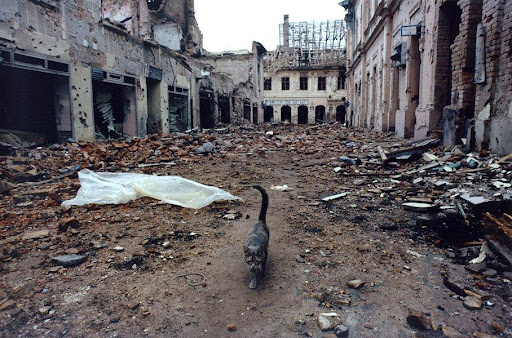A study examining America's wars over the past 125 years found that the United States' military involvement in these conflicts had tragic and unforeseen consequences.
US involvement not only led to millions of unnecessary deaths, but also created new enemies, putting its national security at risk. Here's a list of great wars that, in retrospect, you never should have fought.
Spanish-American War (1898)
A number of historians have concluded that
Spain was hardly responsible for the sinking of the battleship USS Maine, which served as the catalyst for the US declaration of war against Spain.
America pushed its adversary into colonial lines by taking control of the Philippines and fighting a three-year war with the Filipinos that
It cost the lives of 220,000 Filipinos.
But it also resulted in US troops being stationed outside the Western Hemisphere for the first time in US history, sparking the possibility of an unnecessary military confrontation with Japan.
World War I (1917-1918)
US military involvement in this war
it essentially prevented Britain and France from going bankrupt and being militarily exhausted, or from being forced to negotiate a much more just and equitable peace.
A more just peace would have prevented the creation of Nazi Germany, Communist China, and perhaps even the Soviet Union, and would have saved the lives of hundreds of millions of people who were later slaughtered by these totalitarian regimes or died in the wars they started. As the United States tipped the scales against the Central Powers, Imperial Germany was forced to accept the revenge-fueled Treaty of Versailles, which shattered the German economy, deprived it of 12-13 percent of its population and territory, and of its self-defense. This arrangement was forced upon the defeated Germans, and they were forced to accept harsh terms, although if they had realized the injustice the Allies wanted to inflict on them, they might have fought on.
Vietnam War (1965-1973)
The reason for the US war in Vietnam was to protect the Republic of South Vietnam from a communist takeover.
However, Vietnam was never a vital US national interest, the loss of 58,000 soldiers killed in action cannot be justified, and it did not improve national security.
All of this is important to emphasize because the communist North Vietnam eventually annexed South Vietnam, and the communists took control of Laos and Cambodia as well. The Vietnam War turned out to be the biggest US strategic blunder since President Harry Truman cut off military aid to the Nationalists in 1946, when they were on the verge of winning the Chinese Civil War - which resulted in China falling to the Communists.
First Iraq War (1991)
The first Gulf War of 1991 was unnecessary, not only because Saddam Hussein did not threaten to invade Saudi Arabia, as George HW Bush claimed, but also because he made several peace offers, such as withdrawing from all of Kuwait except Rumalia oil field and Bubiyan Island. But even if Saddam did not offer to withdraw his troops, Iraqi control of Kuwait in no way threatened US national security. The most notable is that
Iraq was a US client state until it invaded Kuwait in August 1990 after receiving a "green light" from the US ambassador to Iraq, April Glaspie.
By decimating the Iraqi army while forcing it out of Kuwait, the United States damaged Iraq's ability to continue the war on terror in Iran, which President Ronald Reagan strongly supported.
The subsequent UN embargo and US bombing of Iraq continued for a decade after the war's supposed end, killing up to half a million Iraqi children.
Most importantly, however, the US war on Iraq also set in motion a chain of events that led to Osama bin Laden's September 11, 2001, attacks on the Twin Towers and the Pentagon. Of course, these events led to the US's unnecessary global war on terrorism, which cost hundreds of thousands of civilian lives over two decades.
NATO-Yugoslav War (1999)
In 1999, NATO armed the drug-trafficking terrorists of the Islamist Kosovo Liberation Army and fought alongside al-Qaeda insurgents in the fight against the Yugoslav government, bombing government and military forces, including the capital, Belgrade.
It was NATO's first unprovoked aggression; the association then struggled to give its existence a new purpose after the collapse of the Soviet Union.
In many ways, we can say that this war, as well as NATO's eastern expansion to the countries of the former Warsaw Pact (Poland, the Czech Republic, and Hungary), marked a key turning point in American-Russian relations: instead of cooperation, their relationship was now determined by confrontation. Yeltsin's replacement by Putin at the end of the year marked the beginning of the second Cold War with Russia.
Second Iraq War (2003–present)
The 2003 US invasion of Iraq to overthrow the regime of Saddam Hussein,
it was an absolutely unprovoked, illegal, war of aggression.
As the year-long search for weapons of mass destruction proved, Saddam destroyed his entire arsenal of nerve agents before the war. But even if it hadn't, it wouldn't have sponsored terrorist attacks against the US or Israel, nor posed a threat to the US, which at the time had 7,000 strategic nuclear weapons. Iraq's armed forces were severely depleted, losing more than 60 percent of their tanks and other heavy weapons, and Saddam had not threatened his neighbors since the end of the previous war.
Due to the US invasion and occupation of Iraq, Islamist terrorists, including Al-Qaeda and ISIS, established a foothold in Iraq and extended their influence to Syria.
Meanwhile, Iranian Shiite Islamists seized power in Iraq in a rigged election in 2005, further extending the Islamic Republic of Iran's imperial influence westward toward Israel.
An estimated 151,000 to 1,033,000 Iraqis died in this US war.
By comparison, Saddam reportedly killed 300,000 people during his nearly quarter-century rule.
Syrian Civil War (2011–present)
US military support for Islamist extremists and terrorists began with the CIA providing modern weapons to the Mujahideen fighting against the Soviet occupation of Afghanistan between 1979 and 1989. However, this strategy extended far beyond Afghanistan and extended to Libya and Syria; the US called it: the war on global terrorism. In Syria, it specifically provided military aid to extremist Islamist groups that, in collaboration with Al-Qaeda, sought to overthrow the regime of Bashar al-Assad.
As a result of the conflict, 610,000 Syrians are believed to have died – and many more have fled – and Russia and Iran have expanded their influence in Syria.
The First Libyan Civil War (2011)
This was NATO's second unprovoked military intervention, this time in Libya.
During the 2011 Libyan civil war, NATO participated in the bombing of Libyan government forces in a campaign strongly reminiscent of the unprovoked NATO bombing during the 1999 Yugoslav civil war and the 2003 US invasion of Iraq. His support for the Islamist rebels was successful, he achieved regime change: he overthrew and killed Muammar al-Qadhafi, the leader and dictator of Libya. After that, however, NATO intervention fueled a devastating civil war that lasted several years and divided the country into different, competing factions. Al-Qaeda has also gained significant ground in the country.
Conclusion
If the United States had pursued a more realistic foreign policy in order to avoid unnecessary conflicts, the long-term adverse consequences of wars could have been avoided, and the number of adversaries threatening the national security of the United States would also have been significantly reduced. Tens of millions would have survived.
The US and NATO wars of aggression against Yugoslavia, Iraq, Syria and Libya undoubtedly belie NATO's claim that it defines itself as a purely defensive alliance with no offensive objectives.
Furthermore, if NATO does not bomb Yugoslavia and avoid its eastern expansion, a new cold war with Russia will not develop, and the Ukrainian-Russian war would not have occurred. Especially not if the US and NATO had found a way to bring Russia into a mutual security agreement and integrate it into the West.
Featured Image: South Slavic War / Conflict Researcher













